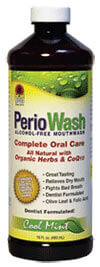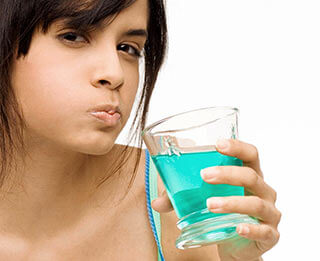Using Mouthwash
The which, why, and how of mouthwashing with mouthwash
Using mouthwash is a good practice to do to maintain your oral health and to get rid of bad breath. It is effective in reaching the areas that the toothbrush can't reach such as in between the teeth, the back of the throat, and on the inside of the cheeks. In this article we will cover how to use mouthwashes, how to gargle, different mouthwash solutions, and general mouthwash usage tips.
How to use mouthwash
Pour the correct amount of mouthwash according to the manufacturer into your mouth.
Rinse and swish vigorously in your mouth for 30-60 seconds.
At this point you may choose to spit this solution out and use new solution to gargle, or you may use the current solution in your mouth.
Gargle the solution for 30-60 seconds as well. 30-60 seconds might seem long but it is important to do because a lot of the bacteria that causes bad breath reside in the back of the mouth by the throat.
Spit out the solution in the sink.
At this point you may choose to rinse your mouth out with water, or you may choose to leave the residual mouthwash in your mouth to continue to work a bit longer. If you choose to leave it in, try not to drink or anything for 10 minutes. If you use a strong mouthwash that uses a high concentration of alcohol or hydrogen peroxide, it might not be a good idea to not rinse your mouth. Leaving strong mouthwash in your mouth may irritate, dry, or cause other problems in your mouth. Test different methods to see what works best for you.
Use mouthwash before or after brushing?
Do you think it's better to use mouthwash before or after brushing?
There has always been a debate whether to use mouthwash before or after brushing your teeth. There are logical arguments for both but few studies prove statistically what is most effective. One of the arguments people and dentists make who recommend using it before state that using it before brushing allows the mouthwash to loosen up the plaque and particles on and in between the teeth so it is more easily removed by brushing the teeth afterwards.
The other side states that mouthwash does little in the short amount of time to loosen the particles and it is more effective to use after brushing in order to thoroughly rinse and disinfect the mouth after the plaque and particles have been cleared by brushing. If you use mouthwash after brushing you may also elect to leave residual mouthwash in your mouth by not rinsing your mouth out with water after using mouthwash. This gives the mouthwash longer time to work.
There is a poll on this subject to the right. Please share with us what you do by voting.
How to Gargle
Have mouthwash solution in your mouth.
Take a deep breath.
Tilt head back as far as you can.
Open your mouth as much as you can (I find that this is more effective then barely opening your mouth).
Say "Ahhhh" like you do at the doctor when the are checking your throat.
You do not have use a lot of air or say "ahhh" loudly to do it. I find that saying "ahhh" in a pitch as low as i can while not using a lot of air to do is most effective for me. You should do it a slowly as you can without it making you cough or gag. If you do it too slowly the solution will slide down your throat and cause a coughing fit.
Once you run out of air, title your head forward back to its normal position to rest your neck and to also take in another deep breath.
Tilt your head back and do the process over again. It usually takes 3-4 breaths and gargling sessions to meet the 30-60 second gargling requirement.
Best Mouthwash Solutions

Avoid Alcohol
Although alcohol works as a good antiseptic in mouthwash, it unfortunately is too harsh and it dries out the mouth. Mouthwash that contains alcohol usually contains about 20-30%. That is why it burns so much when you swish it around in your mouth and gargle it. If used regularly, this alcohol can damage the cells in the mouth and cause oral sores over time.
A dry mouth is bad news when it comes to bad breath. Alcohol acts as a desiccant and dries out the mouth which in turn lowers saliva production. Saliva is very important in fighting bad breath, because saliva is oxygenated and that kills the anaerobic bacteria in the mouth.
When selecting mouthwash, select a mouthwash that is free of alcohol. The majority of mouthwashes do contain alcohol but a few mouthwashes are starting to appear in the market which are alcohol free. Listerine who is famous for its burning sensation has even put out a new mouthwash that is alcohol free recently. Check the list of ingredients on the back before buying.
BreathMD's Favorites: At BreathMD, when we aren't using our own home-brewed mouthwash, you will find us using Biotene and Periowash
.
Effective Mouthwash Ingredients
There are several alternatives to alcohol that are being researched. Dental researchers have found that oxidizing chemicals are effective at killing the anaerobic bacteria and neutralizing the volatile sulfur compounds that the bacteria produce. Some oxidizing chemicals that are found in mouthwash are hydrogen peroxide, zinc chloride, and chlorine dioxide.
Check out our article on making your own homemade mouthwash in order to make your own inexpensive and effective mouthwash.
Use Warm Water
When diluting commercial mouthwash or when using a mouthwash solution you mixed yourself, use warm water. Warm water simply does a better job at cleaning compared to cold water. That is why when you wash dishes it is best to use the hottest water you can withstand without becoming too uncomfortably hot.
After brushing, scraping, and using mouthwash, it would be a good time to take some Oral Probiotics to encourage healthy bacteria growth over bad breath odor causing bacteria.






well people how goes it using mouth wash my hair is down to my knees now I will be sueing
It's not the mouthwash that burns. It is the essential oils that also work as an antiseptic. The alcohol is only added to prevent the essential oils from coming out of solution. Don't believe me? Take a look at Listerine vs Listerine Zero. While alcohol may add to the burning sensation, you'll find Listerine Zero's list of essential oils is way further down on the ingredients list due to having a smaller amount of them. This forced Listerine to remove the "antiseptic" label from the bottle of Listerine Zero, as it is the essential oils that give it its antiseptic quality; not the alcohol.
Strong mouthwash like Listerine can take away protective elements that help your teeth. Best to use a flouride wash once a day but never swallow the solution that can be dangerous
I use mouthwash and i rinse it out with water but for some reson after i use it spit keeps on coming in my mouth why?
mouthwash
My dentist told me to use mouthwash 20min before or 20min after I brush. But is there an easier way of doing this as I have to eat breakfast.
bad breath
I seen to understand that bad breath is caming from our stomach although brushing and washing mouth help to removed some bad bacteria.We have to check the intestine.
You're not suppose to rinse your mouth out with water when using fluoride mouthwashes! You mention this no where
when I use this stuff my toes curle up and sting I wash my hair with this stuff I was almost bald and after washing my hair with this I had a full head of hair in about seven months !
@Awesome Guy125
Same! Listerine stings my mouth when I use it but it's the only kind my mom has. It also dried my mouth w/ the fact that I couldn't eat or DRINK for 30 min, my mouh was even drier!😣
I used to use Therabreath, was ok but then tried ProFresh for my bad breath and it really really helps. I had tonsil stones too and though it took a while for the existing ones to go, the mouthwash seems to have done the trick.
hey guys..whats up with you all.
i can't understand when to wash my mouth with water after using the mouthwash...
Spry Cool Mint is a great mouthwash. Can get it at health food store in Canada.
I agreed with the majority of the poll takers. I usually use my mouthwash after I have brushed my teeth. I think this gets rid of all the loosened particles that brushing causes.
http://www.northgatedentalcentre.ca/
Although Conrad makes a fairly convincing point he fails to credit his 'credible' source(s); as he has acknowleged his disgust with the lack there of in this article.
I spent 10 minutes researching online and found the following from credible sources which directly contradicts your article. Only 10 minutes! Who is this author? Brutal. 1) Essential oils, not alcohol, are the active ingredients. Alcohol is an agent to keep the ingredients in solution, 2) the essential oils cause the burning, not alcohol. Alcohol dries the tissue which may contribute to the burning sensation but it is not the primary culprit, 3) there is a study proving alcohol does not negatively affect salivary glands.
I always rinse 1 to 2 hours after i brush my teeth. I do this because my dentist said the teeth get saturated with minerals and the fluoride in the tooth paste, thus it will not absorb any of the elements in the mouth wash. She recommended to rinse 1 to 2 hours after for maximum cleanliness and absorption.
I also never brush my teeth right after a meal, 'cause of tooth enamel erosion (i just rinse my mouth with water and brush my teeth 1 hour later).
It stings my mouth using listerine :/ I don't like it but I don't have a choice because my mom won't get anything else! Ugh!!! Why can't we use the gel that dentists use after cleanings? They said that stuff is better than mouthwash, could it be possible to use that instead?
mouth wash
I prefer washing mouth before brushing.
I prefer using mouthwash before brushing
If you use a fluoride toothpaste, you will rinse the fluoride off of your teeth (even if you use ACT because it has less than toothpaste), opening yourself up to tooth decay! Rinse before you brush!
How about rinsing before and after brushing. What I do. :)
You want the mouth wash with alcohol. Alcohol doesn't directly kill bacterial cells, but when the alcohol dries up it will cause the cells to lyse. Therefore dry mouth after mouth washing = less bacteria
Toms of Maine
Can Listerine and other antiseptic mouthwashes help prevent oral thrush?
Swish mouthwash is good stuff.. They sell it at Walmart in flavours tropical tease & cinnamon good stuff but in small bottle..
the best to use is simple bicarbonate of soda quarter teaspoon in small glass of water - kills most germs and is safe and cheap
My personal favorite is Closys Oral Rinse. It does a great job.